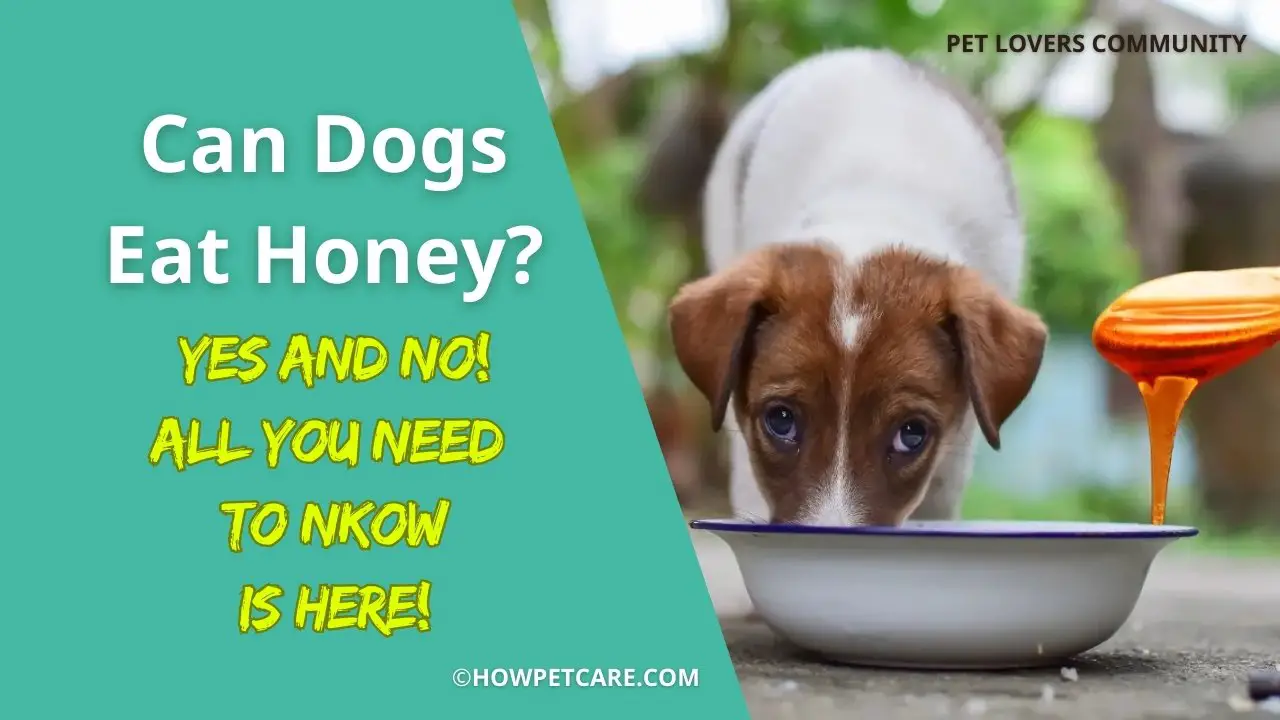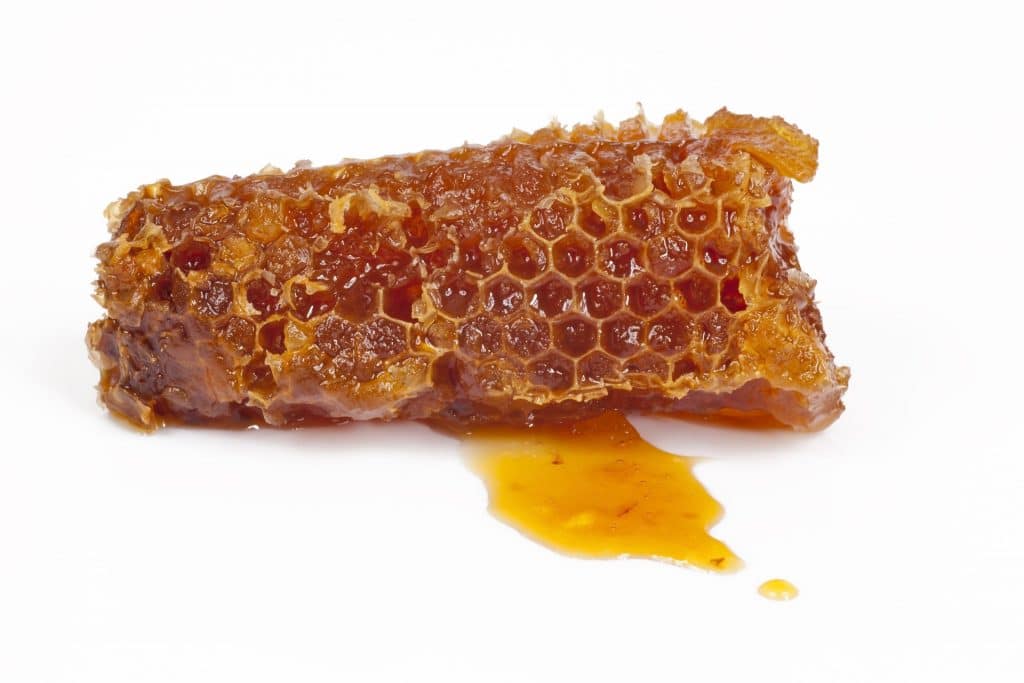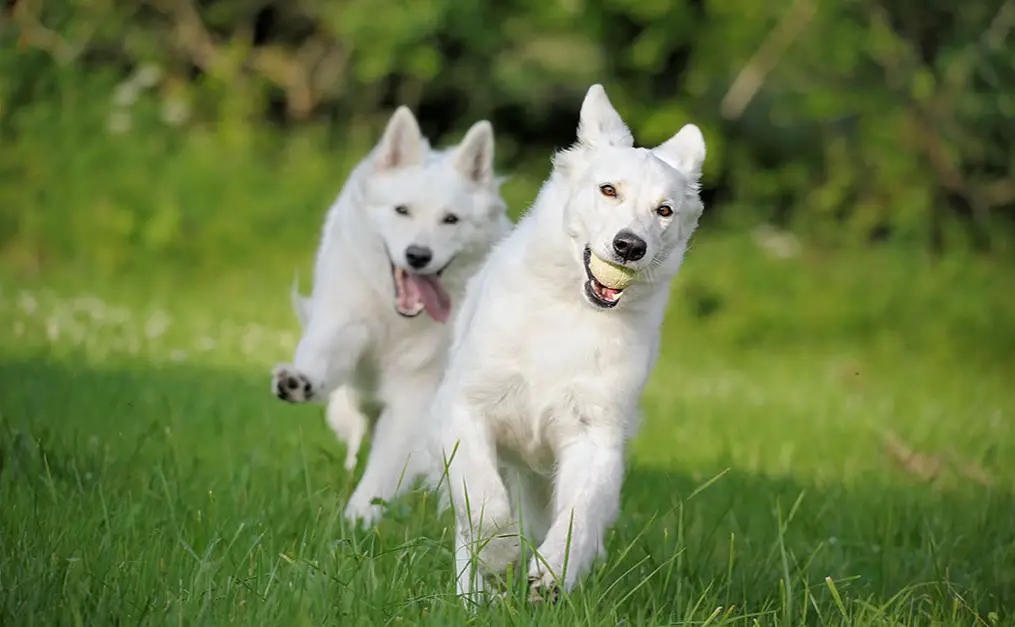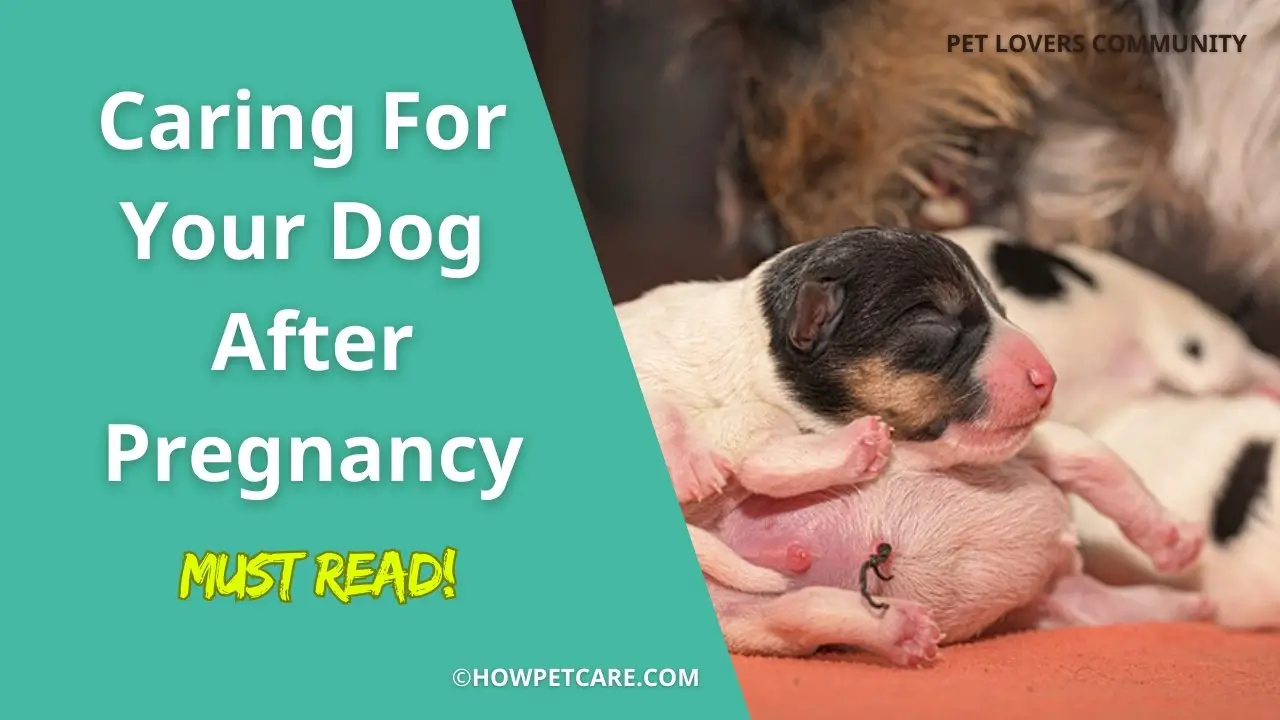Can dogs eat honey? If you’re wondering whether this sweet treat is safe for your furry friend, you’re not alone.
In this guide, we’ll dive into the benefits and risks of feeding honey to dogs, ensuring you make the best decision for your pet’s health.
Can Dogs Have Honey?

Honey, a natural sweetener produced by bees, is a common ingredient in many human foods and beverages.
But can it be a treat for our four-legged friends? The short answer is yes, but with caution.
Benefits of Honey for Dogs
Honey is a natural source of sugar, vitamins, and minerals, including trace amounts of B vitamins and antioxidants.
In small quantities, it can be a safe, even beneficial, treat for dogs.
Potential Health Benefits: Honey’s antibacterial properties make it a popular natural remedy for minor wounds and skin irritations.
Applying a small amount of honey to a minor wound can help promote healing and prevent infection.
In addition, honey has shown promise as a natural remedy for seasonal allergies.
Some holistic veterinarians recommend using local honey to help dogs build resistance against pollen, though more research is needed to confirm this.
However, it’s important to note that honey is not a substitute for conventional veterinary care.
A Sweet Treat: For dog owners seeking a natural and potentially beneficial treat, honey offers a palatable alternative to other processed sweets.
A small spoonful of honey can provide a sweet treat that can be added to their food or given as a reward for good behaviour.
Risks of Honey for Dogs
While honey can be beneficial for dogs, there are also potential risks to consider.
High Sugar Content: Honey is primarily composed of sugar, and excessive sugar consumption can lead to weight gain, dental problems, and even contribute to the development of health issues like diabetes in dogs.
Gastrointestinal Issues: Like any new food, honey can cause digestive upset in some dogs.
If a dog consumes a large amount of honey, it can lead to diarrhoea, vomiting, and bloating.
Honey Allergies: While rare, some dogs may have allergies to honey.
Symptoms of a honey allergy can range from mild itching and hives to more severe reactions like anaphylaxis.
Moderation is Key
The key to offering honey to your canine companion is moderation.
Always start with a very small amount and monitor your dog for any adverse reactions.
If your dog shows any signs of digestive issues or allergic reactions, stop giving them honey and consult with your veterinarian.
Can Dogs Have Honeydew?
Honeydew is a type of melon often used in salads and baked goods.
But what about its safety for our furry friends? The answer is a qualified yes.
The Sweet Nectar of Honeydew
Honeydew is a refreshing and nutritious treat for humans but can it be a safe snack for dogs?
The answer is usually yes, as long as it’s given in moderation.
Honeydew and Canine Health
Nutrient-Rich: Honeydew contains vitamins A, C, K, and B6, along with minerals like potassium, magnesium, and manganese.
These nutrients can contribute to overall canine health.
Hydration Boost: Honeydew’s high water content makes it a refreshing treat that can help keep dogs hydrated, especially during hot summer months.
Cautions with Honeydew
Sugar Content: Honeydew is naturally sweet and contains a moderate amount of sugar – it can contribute to weight gain if given in excessive quantities.
If your dog suffers from diabetes, it’s best to avoid honeydew.
Potential for Digestive Upset: While typically safe for dogs, honeydew can cause digestive issues like diarrhoea or vomiting in some cases, particularly if consumed in large amounts.
It’s always best to start with small amounts and monitor your dog for any adverse reactions.
Seeds and Rinds: Avoid giving your dog honeydew rinds or seeds as these can be a choking hazard.
Can Dogs Have Honey Nut Cheerios?

Honey Nut Cheerios are a popular breakfast cereal for humans, but can this sweet breakfast treat be shared with our canine companions?
The answer is a resounding no.
Cheerios and Canine Health
Cheerios, even the honey nut variety, are not meant for canine consumption.
High Sugar Content: Honey Nut Cheerios contain a high amount of sugar, making them unhealthy for dogs.
Excessive sugar intake can contribute to weight gain, dental problems, and even health issues like diabetes.
Artificial Additives: Honey Nut Cheerios contain artificial flavours, colours, and preservatives that can be harmful to dogs.
These additives can cause gastrointestinal issues or allergic reactions.
Choking Hazard: Cheerios are small and can be a choking hazard for dogs, especially smaller breeds.
Safer Alternatives
If you want to share a cereal treat with your furry friend, consider opting for a dog-safe cereal specifically designed for canine consumption.
Always check the ingredient list and choose options with low sugar content and natural ingredients.
Can Dogs Have Honey Roasted Peanuts?

Honey roasted peanuts are a popular snack, but are they safe for our furry friends? The answer is a cautious yes, but with important considerations.
Peanuts and Canine Health
Peanuts themselves are generally safe for dogs in moderation. They are a good source of protein, healthy fats, and vitamins.
However, honey roasted peanuts introduce a new set of challenges.
Honey Roasted Peanuts: The Dilemma
High Sugar Content: Honey roasted peanuts contain a high amount of sugar due to the honey coating.
This sugar can lead to weight gain, dental problems, and other health issues in dogs.
Salt Content: Many honey roasted peanuts are heavily salted, which can be harmful to dogs.
Excessive salt consumption can lead to dehydration, vomiting, diarrhoea, and even more serious health problems.
Additives: Some honey roasted peanut brands contain artificial flavours and colours that can be harmful to dogs.
Safer Alternatives
If you want to give your dog peanuts, opt for plain, unsalted peanuts and give them in very small quantities.
Can Dogs Have Honey Mustard?

Honey mustard is a popular condiment, but is it safe for dogs? The answer is a clear no.
Honey Mustard: A No-Go for Canine Companions
While honey itself can be safe for dogs in limited amounts, honey mustard is a definite no-no.
High Sodium and Sugar Content: Honey mustard is a high-sugar and sodium-rich condiment, both of which can be detrimental to a dog’s health.
Excessive sodium can lead to dehydration, vomiting, diarrhoea, and other health issues.
While honey can be beneficial in small amounts, the combined impact of honey, mustard, and added sugar makes honey mustard a risky option for dogs.
Ingredients to Avoid: Honey mustard often contains ingredients like onion and garlic powder, which are toxic to dogs.
These ingredients can cause digestive upset, anaemia, and even liver damage.
Choking Hazard: Honey mustard is a thick, sticky sauce that can pose a choking hazard to dogs.
It can also irritate the digestive system and cause an upset stomach.
Safer Alternatives
If you want to add a sweet and savory flavour to your dog’s food, consider using natural options like plain yogurt, cooked sweet potatoes, or a small amount of pumpkin puree.
These ingredients are safe for dogs and can add variety to their diet.
Can Dogs Have Honey Peanut Butter?

Honey peanut butter, a familiar combination of sweet and savory, is a popular treat for humans.
But can it be shared with our canine companions? The answer is a cautious yes, with important caveats.
The Challenges of Honey Peanut Butter for Dogs
While peanut butter itself is generally safe for dogs, honey peanut butter presents a different story.
High Sugar Content: Honey peanut butter combines the sugar from honey with the naturally occurring sugars in peanuts.
This high sugar content can contribute to weight gain, dental problems, and even health issues like diabetes in dogs.
Xylitol Toxicity: Some peanut butter brands contain xylitol, a sugar substitute that is highly toxic to dogs.
Even small amounts of xylitol can lead to serious health problems, including liver failure.
Always check the ingredients list and ensure that the peanut butter is xylitol-free.
Choking Hazard: Peanut butter can be sticky and can become a choking hazard for dogs, especially smaller breeds.
Always supervise your dog when they are eating peanut butter and make sure they have access to fresh water.
Safely Sharing Peanut Butter with Your Dog
If you choose to share peanut butter with your dog, choose a natural, xylitol-free peanut butter and give it in small amounts. Avoid giving your dog honey peanut butter.
Can Dogs Have Honey Ham?

Honey ham is a popular holiday treat, but can it be shared with our canine companions? The answer is a resounding no.
Honey Ham: A No-Go for Dogs
Honey ham, while tempting for our furry friends, is not safe for dogs.
High Sodium Content: Honey ham is heavily salted, which can be harmful to dogs.
Excessive salt consumption can lead to dehydration, vomiting, diarrhoea, and even more serious health problems.
Fat Content: The high fat content in honey ham can lead to pancreatitis in dogs.
Pancreatitis is a serious condition that can cause inflammation of the pancreas and lead to life-threatening consequences.
Bone Fragments: Honey ham often includes bone fragments that can be a choking hazard or cause internal damage to dogs.
Safer Alternatives
If you want to give your dog a special treat, consider offering them a small amount of cooked, unseasoned chicken or turkey. These meats are safe for dogs and can provide them with some protein.
Can Dogs Have Honeycrisp Apples?
Honeycrisp apples, known for their sweet flavour and crisp texture, are a delicious treat for humans. But are they safe for our furry friends? The answer is a qualified yes.
Honeycrisp Apples: A Fruitful Treat
Honeycrisp apples are a good source of vitamins, minerals, and fiber. These nutrients can contribute to a dog’s overall health and well-being.
Honeycrisp Apples and Canine Health
Vitamin C Boost: Honeycrisp apples contain vitamin C, an important antioxidant that can help boost your dog’s immune system.
Fiber Power: The fiber in apples can help regulate digestion and promote a healthy gut.
Hydration: The high water content in apples can help keep dogs hydrated, especially during hot summer months.
Cautions with Honeycrisp Apples
Sugar Content: Honeycrisp apples are naturally sweet and contain a moderate amount of sugar.
If your dog is prone to weight gain or has diabetes, it’s best to limit their intake of apples.
Choking Hazard: Always cut apples into small, bite-sized pieces before giving them to your dog.
Large chunks of apple can be a choking hazard, particularly for smaller breeds.
Seeds and Core: Avoid giving your dog apple seeds or cores. Apple seeds contain cyanide, which is toxic to dogs.
Can Dogs Have Honey Graham Crackers?

Honey graham crackers, with their sweet honey flavour and satisfying crunch, are a popular snack for humans.
But are they safe for our canine companions? The answer is a clear no.
Honey Graham Crackers: A Treat To Avoid
While graham crackers themselves are generally safe for dogs in very limited amounts, honey graham crackers are a treat to avoid for our furry friends.
High Sugar Content: Honey graham crackers contain a high amount of sugar, which can be detrimental to a dog’s health.
Excessive sugar intake can contribute to weight gain, dental problems, and even health issues like diabetes.
Artificial Ingredients: Honey graham crackers often contain artificial flavours and colours that can be harmful to dogs.
Choking Hazard: Honey graham crackers are small and can be a choking hazard for dogs, especially smaller breeds.
Safer Alternatives
If you want to share a cracker treat with your dog, consider offering them a plain, unsalted cracker specifically designed for canine consumption.
Always check the ingredient list and opt for a cracker with low sugar content and natural ingredients.
Can Dogs Have Honey Wheat Bread?
Honey wheat bread is a popular bread choice for humans, but can it be shared with our canine companions?
The answer is a cautious yes, but with important considerations.
Honey Wheat Bread: A Treat in Small Amounts
While honey wheat bread itself is generally safe for dogs in limited amounts, it’s important to be mindful of the ingredients and potential risks.
Honey Wheat Bread and Canine Health
Potential for Digestive Upset: Honey wheat bread is often high in fiber and can cause digestive issues if consumed in large amounts.
If you introduce honey wheat bread to your dog, do so gradually and monitor for signs of digestive upset.
Sugar Content: While some honey wheat bread options may be lower in sugar than other breads, it still contains added sugar, which can contribute to health problems in dogs.
Yeast and Gluten: While most dogs can tolerate yeast and gluten, some dogs may have sensitivities that can cause digestive upset or allergic reactions.
It’s always important to be aware of any potential allergies or sensitivities your dog may have.
Safer Alternatives
If you’re looking for a safe alternative to honey wheat bread, consider plain, unsalted rice cakes or dog-specific bread specifically designed for canine consumption.
These options are typically lower in sugar and contain no harmful additives.
Can Dogs Have Honey Buns?

Honey buns, with their sweet glaze and irresistible aroma, are a popular treat for humans.
But are they safe for our canine companions? The answer is a clear no.
Honey Buns: A Treat to Avoid for Dogs
Honey buns are a high-sugar and high-fat treat that can be detrimental to a dog’s health.
High Sugar Content: Honey buns are loaded with sugar, both from the honey and from the added sugar in the dough and glaze.
This excessive sugar intake can contribute to weight gain, dental problems, and even health issues like diabetes in dogs.
Artificial Ingredients: Honey buns often contain artificial flavours and colors that can be harmful to dogs.
High Fat Content: The high fat content in honey buns can contribute to pancreatitis, a serious condition that can cause inflammation of the pancreas and lead to life-threatening consequences.
Safer Alternatives
If you want to give your dog a sweet treat, opt for a dog-specific treat that is low in sugar and high in protein.
There are plenty of healthy and delicious dog treats available that are specifically formulated for canine consumption.
Can Dogs Have Honeycomb?

Honeycomb, the natural, waxy structure of honey, is a unique treat for humans but is it safe for our furry friends?
The answer is a cautious yes, with important considerations.
Honeycomb: A Treat with a Twist
While honey itself can be safe for dogs in moderate amounts, honeycomb introduces a new set of challenges.
Honeycomb and Canine Health
High Sugar Content: Honeycomb is essentially pure honey, which means it contains a high amount of sugar.
As with honey, excessive sugar consumption can lead to weight gain, dental problems, and even contribute to the development of health issues like diabetes in dogs.
Wax and Choking Hazard: Honeycomb contains a waxy structure that can be difficult for dogs to digest and can potentially cause choking or digestive issues.
Even though dogs can digest bee wax, it’s best to avoid giving them honeycomb to minimize the risk.
A Safer Option
If you want to offer your dog a sweet treat that’s similar to honeycomb, consider a small amount of plain honey with no added sugars or flavorings.
Ensure the honey is diluted with water and administered in small quantities.
Can Dogs Have Honeydew and Cantaloupe?
Honeydew and cantaloupe are both refreshing melons that are popular snacks for humans.
But are they safe for dogs? The answer is a cautious yes.
Melon Madness: A Safe Treat for Many Dogs
Honeydew and cantaloupe can be a healthy and refreshing treat for dogs, but there are important considerations.
Canines and Melon: A Safe Snack
Hydration Boost: Honeydew and cantaloupe are both high in water, making them a refreshing treat during hot weather.
Source of Vitamins and Minerals: These melons are rich in vitamins A, C, and K, and minerals like potassium.
These nutrients contribute to a dog’s overall health.
Cautions with Melon
Sugar Content: Honeydew and cantaloupe contain a moderate amount of sugar.
If your dog is prone to weight gain or has diabetes, it’s best to limit their consumption of these melons.
Seeds and Rinds: Always remove seeds and rinds before giving melon to your dog.
Both of these can pose a choking hazard and can cause digestive upset.
Limited Amounts: A small amount of honeydew or cantaloupe is generally safe for dogs, but you should always limit their intake and monitor for any adverse reactions.
Can Dogs Have Honey Everyday?
Honey, like most treats, is best enjoyed in moderation. While a small amount of honey might be okay occasionally, having it every day is not advisable for most dogs.
Why Daily Honey Is Not Ideal
Sugar Overload: Daily honey consumption can lead to a sugar overload in your dog’s diet.
This excess sugar can contribute to weight gain, dental problems, and even health issues like diabetes.
Increased Risk of Pancreatitis: Frequent consumption of honey could increase a dog’s risk of pancreatitis, a serious condition that can affect the pancreas.
Nutritional Imbalance: Honey, while nutritious, should not be the sole source of nutrition for your dog.
It lacks the essential vitamins, minerals, and proteins that your dog needs for healthy growth and development.
A Balanced Diet Is Key
A balanced diet that includes high-quality dog food and occasional healthy treats is the best approach for your dog’s overall well-being.
Consult with your veterinarian to determine the appropriate amount of treats, including honey, for your dog’s individual needs.
Can Dogs Have Honey for Allergies?
Some dog owners use honey to address their dog’s seasonal allergies. While honey can be a natural remedy, it’s essential to understand its limitations.
Honey for Allergies: The Hope and Realities
Local Honey Theory: The theory behind using local honey for allergies is that it exposes the dog to small amounts of pollen from the local area, potentially building up a tolerance.
Limited Evidence: While anecdotal evidence suggests that honey may help with allergies, scientific research to date is inconclusive.
Not a Substitute for Veterinary Care: If your dog is experiencing severe allergies, honey does not replace conventional veterinary care.
Allergy Relief for Dogs
If your dog suffers from allergies, consult your veterinarian for appropriate treatments.
They can recommend antihistamines, allergy shots, or other remedies to alleviate your dog’s symptoms.
Can Dogs Have Honey Roasted Cashews?
Honey roasted cashews, a popular snack for humans, are a tempting treat for dogs.
But are they safe? The answer is a cautious yes, but with considerations.
Honey Roasted Cashews: The Risks and Rewards
Cashews themselves can be a nutritious treat for dogs, but honey roasted cashews introduce a new set of challenges.
Canines and Cashews: A Safe Treat with Cautions
High Sugar Content: The honey coating in honey roasted cashews contributes to a high sugar content, which can lead to weight gain, dental problems, and even health issues like diabetes in dogs.
Salt Content: Many honey roasted cashews are heavily salted, which can be harmful to dogs.
Excessive salt consumption can lead to dehydration, vomiting, diarrhoea, and other health problems.
Additives: Some honey roasted cashews include artificial flavors, colours, and preservatives that can be harmful to dogs.
A Safer Option
If you choose to share cashews with your dog, opt for plain, unsalted cashews and offer them in very small quantities.
Video

Final Words
Can dogs have honey? The answer is a nuanced yes, but it’s essential to understand the potential risks and benefits.
Honey, while a natural sweetener, can be high in sugar and could potentially lead to weight gain, dental problems, or even health issues like diabetes in dogs.
Therefore, it’s crucial to offer honey in moderation, considering your dog’s individual needs and health status.
Before introducing any new food to your dog’s diet, consult with your veterinarian.
They can provide tailored advice based on your dog’s breed, age, health condition, and any potential allergies.
Remember, a balanced diet, along with regular exercise and veterinary care, are essential for your dog’s overall well-being.









